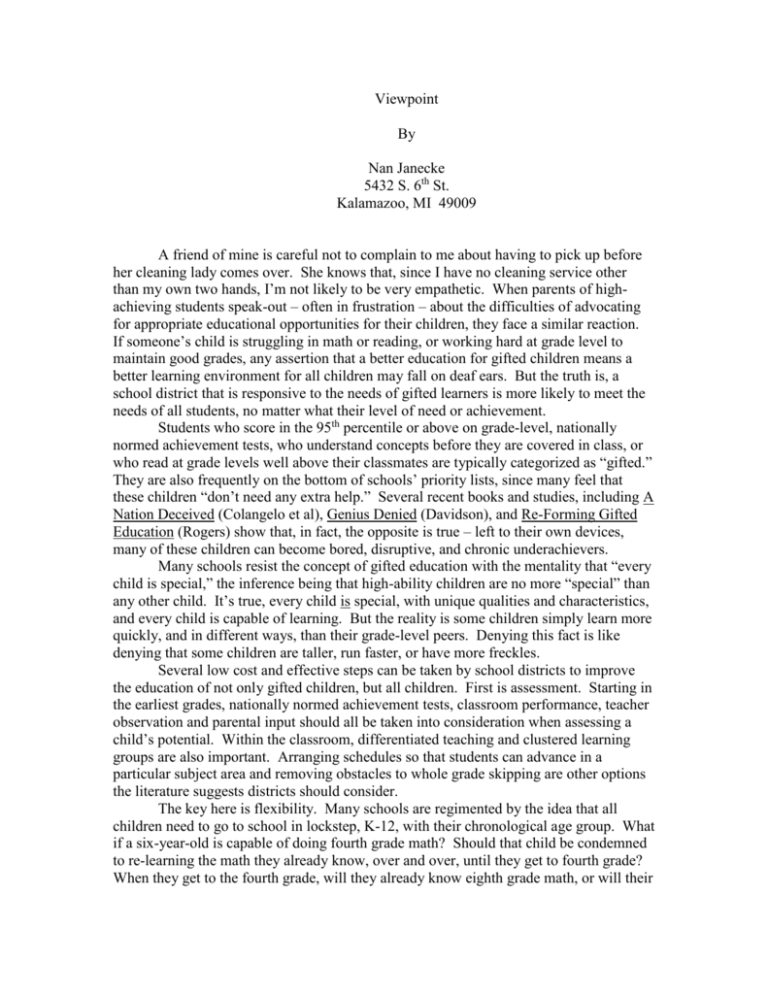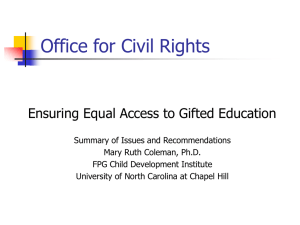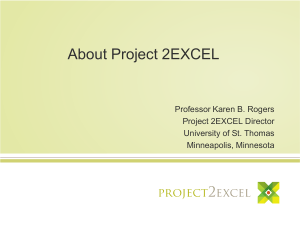Viewpoint
advertisement

Viewpoint By Nan Janecke 5432 S. 6th St. Kalamazoo, MI 49009 A friend of mine is careful not to complain to me about having to pick up before her cleaning lady comes over. She knows that, since I have no cleaning service other than my own two hands, I’m not likely to be very empathetic. When parents of highachieving students speak-out – often in frustration – about the difficulties of advocating for appropriate educational opportunities for their children, they face a similar reaction. If someone’s child is struggling in math or reading, or working hard at grade level to maintain good grades, any assertion that a better education for gifted children means a better learning environment for all children may fall on deaf ears. But the truth is, a school district that is responsive to the needs of gifted learners is more likely to meet the needs of all students, no matter what their level of need or achievement. Students who score in the 95th percentile or above on grade-level, nationally normed achievement tests, who understand concepts before they are covered in class, or who read at grade levels well above their classmates are typically categorized as “gifted.” They are also frequently on the bottom of schools’ priority lists, since many feel that these children “don’t need any extra help.” Several recent books and studies, including A Nation Deceived (Colangelo et al), Genius Denied (Davidson), and Re-Forming Gifted Education (Rogers) show that, in fact, the opposite is true – left to their own devices, many of these children can become bored, disruptive, and chronic underachievers. Many schools resist the concept of gifted education with the mentality that “every child is special,” the inference being that high-ability children are no more “special” than any other child. It’s true, every child is special, with unique qualities and characteristics, and every child is capable of learning. But the reality is some children simply learn more quickly, and in different ways, than their grade-level peers. Denying this fact is like denying that some children are taller, run faster, or have more freckles. Several low cost and effective steps can be taken by school districts to improve the education of not only gifted children, but all children. First is assessment. Starting in the earliest grades, nationally normed achievement tests, classroom performance, teacher observation and parental input should all be taken into consideration when assessing a child’s potential. Within the classroom, differentiated teaching and clustered learning groups are also important. Arranging schedules so that students can advance in a particular subject area and removing obstacles to whole grade skipping are other options the literature suggests districts should consider. The key here is flexibility. Many schools are regimented by the idea that all children need to go to school in lockstep, K-12, with their chronological age group. What if a six-year-old is capable of doing fourth grade math? Should that child be condemned to re-learning the math they already know, over and over, until they get to fourth grade? When they get to the fourth grade, will they already know eighth grade math, or will their brain have atrophied to the point where they are no longer interested in math? This is true for language arts, science and social studies as well. Schools will have to rethink outdated policies to ensure that every child receives an education at his/her academic level, as opposed to his/her age group. Why should the general public care about the educational fulfillment of gifted children? To parents, the fact that your school is doing everything it can to meet the educational needs of every child means that they care not just about meeting state standards, but helping each child meet his or her full potential. Once in the workforce, fully realized students can become the creative and leadership forces behind tomorrow’s innovations - architects, inventors, engineers, researchers - the list is endless. Gifted education is an important issue not just for students and their parents, but for everyone in our community. We cannot afford to lose an entire generation of bright children to apathy and poorly drawn assumptions about their educational requirements. School districts can and should create policies that allow every student the opportunity for unlimited success. Implementing these policies is essential to a better future for them, and for us. Nan Janecke, President Partners in Learning for Unlimited Success www.PLUSofSWMI.org






